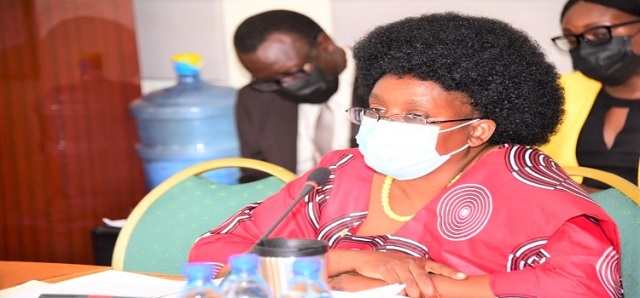
Kampala, Uganda | THE INDEPENDENT | The Minister of Science, Technology and Innovation, Dr. Monica Musenero has defended the cost of mice that are going to aid the process of developing a Covid-19 vaccine in Uganda.
Musenero who is facing a parliamentary investigation over the management of 31 billion Shillings initially appropriated for the vaccine development process, on Friday appeared before the Select Committee to provide accountability for the funds.
The investigation stems from documentary evidence tabled before Parliament recently by Ntungamo Municipality MP Yona Musinguzi, seeking to implicate Musenero regarding the utilization of funds meant to facilitate the COVID-19 vaccine development.
Musinguzi demanded accountability for funds so far released towards the development of a vaccine under the Presidential Scientific Initiative on Epidemics-PRESIDE, a brainchild of President Yoweri Museveni led by Dr. Musenero, who was a Presidential Advisor on Epidemics at the time it was unveiled.
Both Musinguzi and Musenero appeared before the Select Committee last week but a session between MPs and the Minister was closed to journalists upon request by Musenero, over sensitivity of the ongoing research.
Now, Friday’s Select Committee meeting was dedicated to purely accountability of the funds and the Minister was tasked by Butambala Woman MP, Aisha Kabanda to explain the 8 million Shillings dedicated to procuring a single mouse.
Kabanda’s question followed Musenero’s revelation to MPs last week that one of the vaccines being developed is at stage 7 and that they have mice, where each costs 8 million Shillings because they are very special.
In response, Musenero said that the mice are very high technology animals and they will need them together with the necessary facilities to enable the quick development of the vaccine. She said that 8 million Shillings for each mouse is on the cheaper side and called upon Prof. Enock Matovu from Makerere University’s Department of Veterinary to explain further about the mice.
Prof. Enock Matovu further explained that the mice in question have been genetically modified in high-tech processes and are not susceptible to Covid-19.
“So what science has done, is to go into the laboratory and genetically engineer these mice, introduce a part from the human genomes that makes us susceptible… via which the virus enters into our cells, and they have put it into that mouse to make it a model which you can use to study disease,” Prof. Matovu explained in part.
He further said that this is because scientists need something that gets symptoms of coronavirus disease so that they challenge it with the virus, vaccinate it and find out whether the developed vaccine is efficacious.
Prof. Matovu said that the cost for each mouse is high because at purchase, they are provided a license to propagate them.
Tony Awany, the Select Committee acting Chairperson and MP Kabanda further asked about the scientific name of the mice and the purchase order conditions.
In response, Prof. Matovu said that they have ordered for only four mice and these will come with a license allowing Uganda to propagate them locally.
He said that in total, they will need 200 mice to test one vaccine.
“We can produce thousands of these mice as long as we are operating within the limits of this agreement,” explained Prof Matovu. “The mouse multiplies pretty fast and the central research animal facility we have ensures bio-safety and they cannot escape. Secondly, they are a little bit delicate; they cannot survive on their own like in other ordinary ways.”
He said that the strain being procured is BALB/c mouse. This strain according to reports is among the most widely used inbred models used in biomedical research, and it is particularly utilized in immunology and infectious disease.
Prof. Matovu said that the mice are going to come from United States of America after Uganda’s initial attempts to get them from China did not yield fruit.
MP Awany encouraged the researchers to always update the country about the progress of their work so that the public is not kept in the dark.
Musenero welcomed the advice saying that they will build on their communication.
*****
URN
 The Independent Uganda: You get the Truth we Pay the Price
The Independent Uganda: You get the Truth we Pay the Price




BALB/c Mice Details
The BALB/c mouse is among the most widely used inbred models used in biomedical research, and is particularly utilized in immunology and infectious disease research. Their ability to produce plasma cell tumors within soft tissue is important in the production of monoclonal antibodies (mAbs).
With BALB/c mice, Th2 cells are easily triggered by immunization, meaning this mouse strain is an exceptional responder to immunization. The BALB/c model can be used to identify genes that determine susceptibility to infectious and neoplastic diseases.